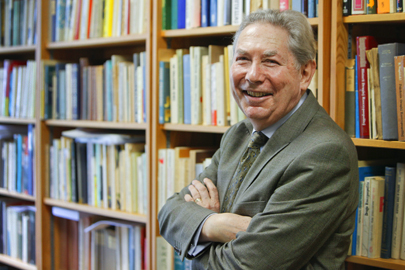Polonsky to receive Kulczycki Prize for work in Polish studies
 Photo/Mike Lovett
Photo/Mike LovettProfessor Antony Polonsky
Antony Polonsky, the Albert Abramson Professor of Holocaust Studies, will receive the inaugural 2011 Kulczycki Prize for his three-volume monograph, “The Jews in Poland and Russia (Littman Library of Jewish Civilization).”
The Kulczycki Prize, formerly known as the Orbis Books Prize for Polish Studies, is awarded each year by the Association for Slavic, East European and Eurasian Studies.“The Jews in Poland and Russia” is a comprehensive political, social, economic, and religious survey of the Jewish communities of Eastern Europe from 1350 to the present.
A native of Johannesburg, South Africa, Polonsky studied history and political science at the University of the Witwatersrand and Oxford. Polonsky spent his student years as a Marxist-Leninist sympathizer and joined the ranks of the Solidarity movement in Poland. It was with the defeat of the first Solidarity movement, in 1981, that the new road opened, Polonsky recently said.
He went to Poland for the first time in 1965 convinced as he had been during his South African student years that communism was in keeping with iron laws of history; he said he was shocked to find that "nothing worked," he said.
Polonsky began researching and writing about Stalinism and the treatment of Poland in the post-World War II period, and moved on to Solidarity. He also found the Poles and the Jews were divided by incompatible views of their shared past. The first step toward reconciliation, Polonsky said, had to be a reckoning and that effort became the foundation of his life’s work.
Among his accomplishments is the creation of the journal, Polin: Studies in Polish Jewry, which he edited for the past quarter-century. Polin bridged the worlds of North American, Polish and Israeli scholars and became an important resource for contributors to new understandings of Polish and east European Jewry.
Polonsky began teaching at Brandeis in 1991 and two years later was granted the Walter Stern Hilborn Chair in Judaic and Social Studies. From 1995 to 1998, he chaired the Department of Near Eastern and Judaic Studies. In 1999, he was appointed the Albert Abramson Professor of Holocaust Studies, which he continues to hold jointly at the United States Holocaust Memorial Museum, in Washington, D.C., and at Brandeis.
Categories: Humanities and Social Sciences, International Affairs






